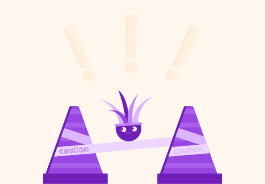YOU ARE LEARNING:
Physical and Chemical Barriers

Physical and Chemical Barriers
Like animals, plants have different physical and chemical barriers in place to help prevent infection from microorganisms.
Humans have an immune system to protect against disease from pathogens, like bacteria. Plants must also protect themselves against pathogens. Which other types of organisms do you think plants must also try to protect themselves against?

Pest attacks cause damage to plants. Why do pests attack plants? Pick all the options you think are correct.

You can select multiple answers
Plants have different types of barriers - physical and chemical. Which of these two types of barriers do you think aims to prevent pathogens from entering the plant?

Which part of a tree do you think is a good physical barrier to many pests and pathogens?

Which part of the leaf do you think is the most effective at preventing pests and pathogens from entering the plant?

If a pathogen did enter the leaf, the cells have a layer of protection to help prevent the pathogen from entering a cell. What do you think it is?

Plants have physical defences against pests and pathogens. Bark is layers of dead cells that prevent pathogens from entering a plant. Leaves have waxy cuticles that work as barriers against damage, pests and pathogens. Finally, plant cells have cell walls that stop pests and pathogens from entering the plant's cells.
Plants also use chemicals to defend themselves. Which type of chemical do you think might stop a herbivore eating a plant?

Humans use chemicals to prevent the spread of bacteria to wounds etc. Some of these are derived from plants and we apply them directly on the wound. What do we call these types of chemical?

Plants also have chemical defences that help prevent damage. Antiseptics (antibacterials) kill pathogens, like bacteria and fungi. They also produce chemicals, like poisons, that discourage pests and animals from feeding on the plant because they taste bad.
